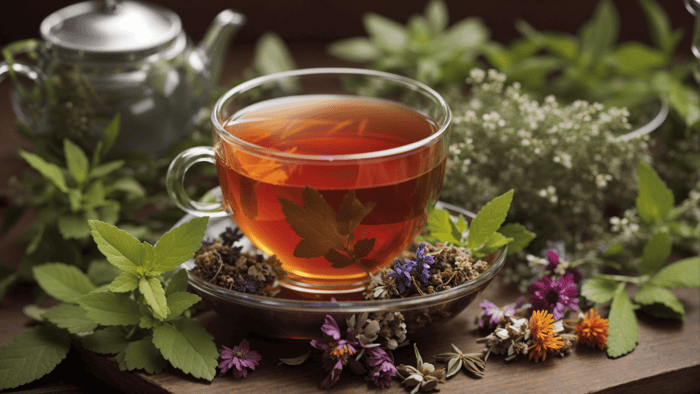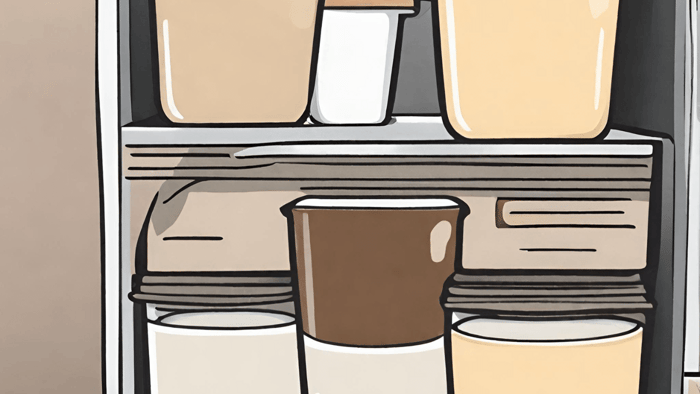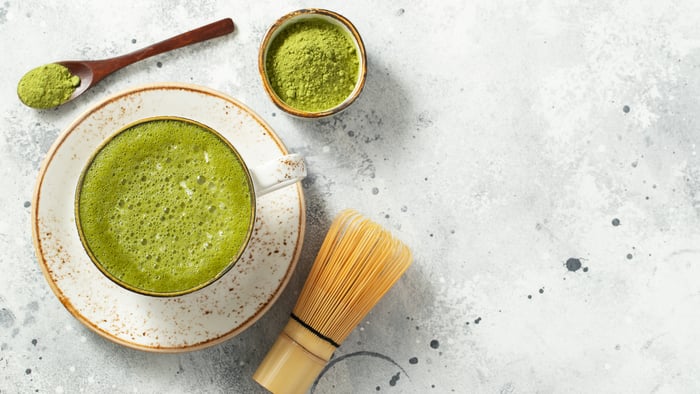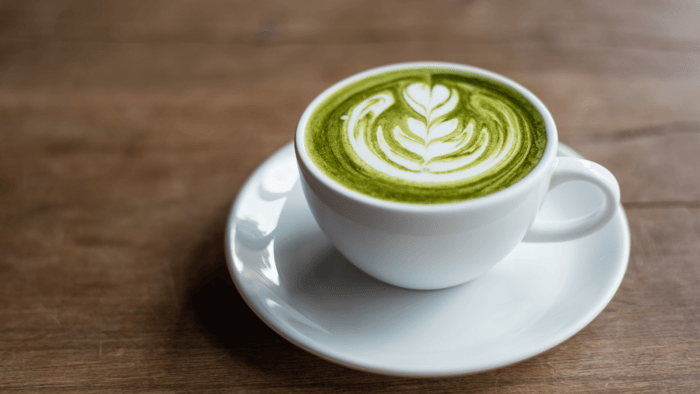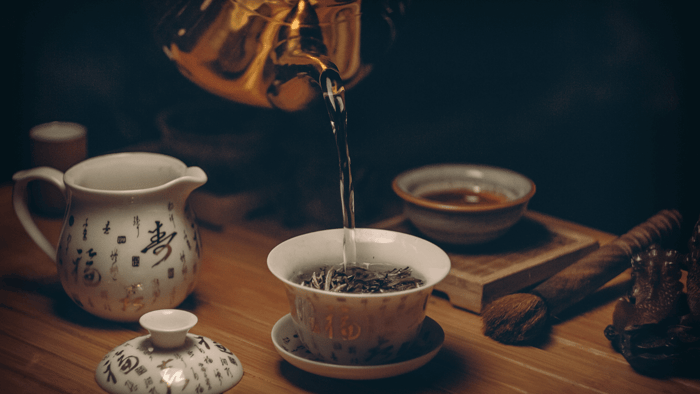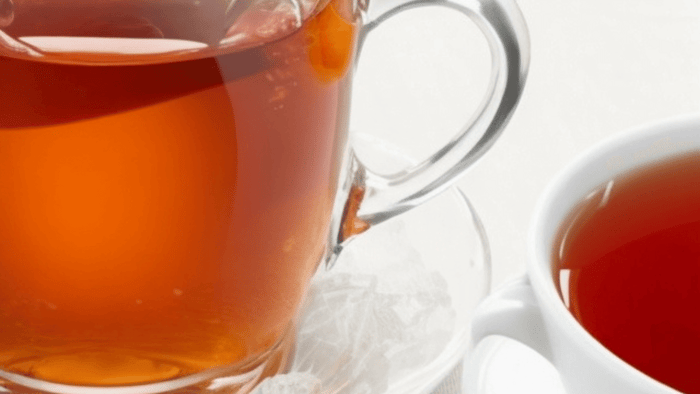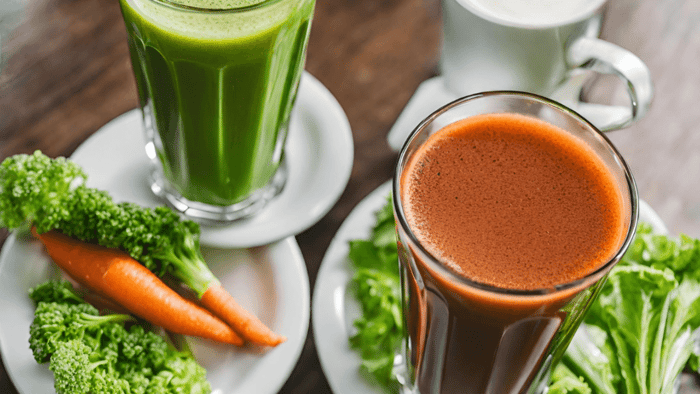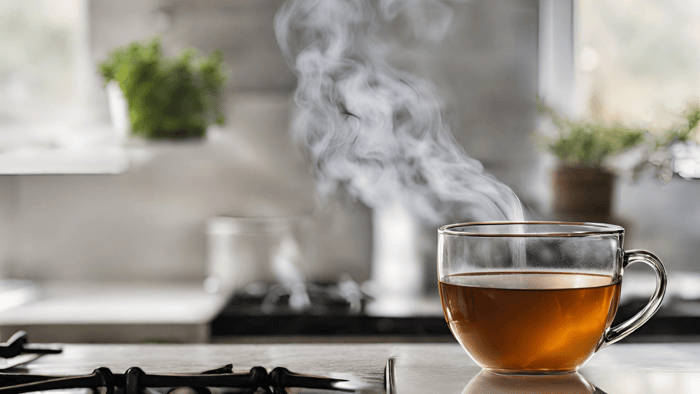Ah, herbal tea! A comforting cup of chamomile, a zesty ginger infusion, or a tangy hibiscus blend can bring warmth and relaxation to any moment. Have you ever wondered, can herbal tea go bad? How long do your favorite herbal teas last or how to store them properly? In this journey, we’ll uncover the secrets to keeping your tea fresh and flavorful, as well as the risks of consuming expired herbal tea. Get ready to become a tea storage expert and enjoy every sip of your favorite brews!
Key Takeaways
-
Herbal tea’s shelf life depends on the type of herbs, processing methods, and storage conditions.
-
Store herbal tea in an airtight container away from heat, light, and moisture to maintain its freshness & quality.
-
Herbal teas offer numerous health benefits such as boosting immunity, improving digestion & reducing inflammation.
Make Tea Drinks With The Elixer Mixer
Understanding Herbal Tea and Its Shelf Life
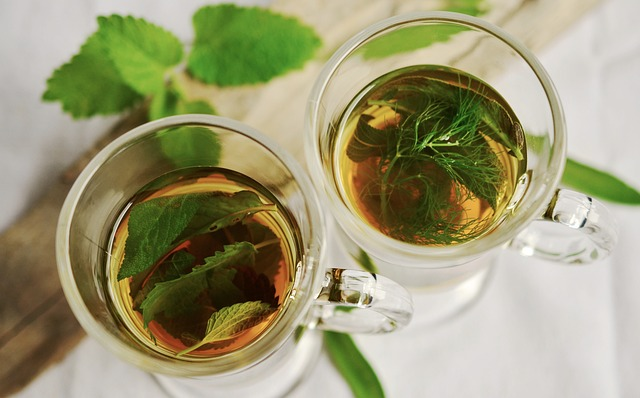
Herbal tea, a delightful concoction made from a mix of herbs, spices, flowers, fruits, and other plant materials, mesmerizes tea lovers worldwide. But what about its shelf life and can herbal tea go bad? Just like any other food or drink, herbal tea has a shelf life that depends on the type of herbs used, the processing methods, and the storage conditions. How long does herbal tea last? Typically, it can last anywhere from 6 months to 2 years, making herbal tea last quite a while.
So, what’s the secret to keep our favorite herbal teas fresh and flavorful throughout their shelf life? The key is to store them away from heat, air, and water. Proper storage not only maintains the tea’s original flavor but also prevents it from losing its health benefits and becoming stale or moldy.
From chamomile to oolong, every tea variety, including oolong tea, has a unique shelf life determined by factors like the herbs used and processing methods. For instance, black tea and green tea have a longer shelf life than their herbal counterparts. Taking into account the differences between tea varieties guarantees that each brewed cup remains as delightful as the last.
Factors That Affect Herbal Tea's Freshness
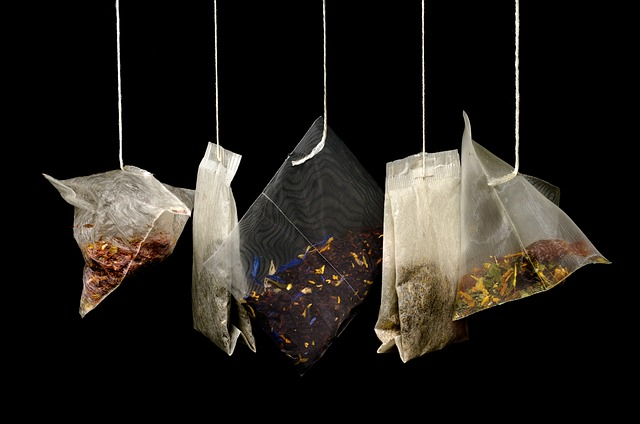
Several factors can impact the freshness of your herbal tea, including:
-
Humidity: can make the tea go stale
-
Air exposure: can cause it to lose its flavor
-
Temperature: extreme temperatures can make the tea bitter
-
Light exposure: can result in discoloration
-
Tea quality: the quality of the tea itself can affect its overall flavor and freshness
Improper storage can lead to a loss of flavor, mold growth, and a foul odor in herbal tea, causing it to expire. Hence, correct storage of herbal tea is vital to avoid premature expiration. By paying attention to these factors and using proper storage techniques, we can maintain the freshness and quality of our favorite herbal teas.
Remember the last time you found a long-forgotten tea bag in the back of your cupboard, only to discover that its once-vibrant flavor had faded into a dull, lifeless brew? That’s what happens when we neglect the factors that affect our tea’s freshness. Acknowledgment of these factors and correct tea storage ensures that every brewed cup remains as delicious and satisfying as the first.
How to Store Herbal Tea for Optimal Freshness
For optimal freshness, herbal tea should be stored in an airtight container in a cool, dry, and dark place. The ideal temperature range for storing herbal tea, including iced tea, is between 40°F - 70°F. Airtight containers, such as tea tins, jars, or sealable bags, are excellent choices for storing both tea bags and loose leaf teas. Keeping air exposure to a minimum will help maintain the tea’s freshness and prevent it from expiring.
Significant alteration in your tea’s flavor can result from sunlight exposure; therefore, it’s essential to shield your tea leaves from direct sunlight. Store tea, especially your herbal tea, in a dark cabinet or a cool, dark place away from direct sunlight, moisture, and strong smells. Proper storage can prolong your tea’s shelf life and ensure it remains fresh and flavorful.
One common misconception is that storing tea in the fridge or freezer will prolong its freshness. However, tea is highly sensitive to moisture and can easily absorb other aromas. Storing it in the fridge or freezer exposes it to a humid environment and other flavors that can mix with the tea leaves, causing them to spoil quickly. To maintain the freshness and quality of your herbal tea, avoid storing it in the fridge or freezer.
Following these storage techniques ensures prolonged freshness and flavor retention of your herbal tea. So, the next time you reach for your favorite brew, you can be confident that it will taste just as fantastic as the day you first bought it.
Recognizing Spoiled Herbal Tea
Signs that your herbal tea has gone bad include:
-
Changes in flavor
-
Changes in aroma
-
Changes in potency
-
Visible signs of spoilage like mold or mildew
If your tea smells musty or has no scent at all, it’s a clear indication that it’s too moist or has lost its freshness. Similarly, if the flavor is dull and unappealing, your tea has likely reached the end of its shelf life.
If your tea has been exposed to humidity or liquid and developed mold, it’s probably expired and unsafe to drink. Consuming moldy or spoiled tea can make you sick or upset your stomach. When in doubt, it’s always better to err on the side of caution and discard any tea that shows visible signs of spoilage or has an off flavor or aroma.
Recognizing and discarding spoiled herbal tea guarantees each brewed cup is safe to drink and retains the delightful flavors and aromas we love. After all, there’s nothing more disappointing than brewing a cup of your favorite tea, only to discover that it’s past its prime and no longer enjoyable due to tea expiration.
Risks Associated with Consuming Expired Herbal Tea
While expired herbal tea is generally safe to drink, it may not have the same flavor or effectiveness as fresh tea. The tea should be discarded if it appears to be moldy or rotten. It is advisable not to take a chance by consuming such tea, as herbal tea can affect the quality. Similarly, tea bags expire and may lose their potency over time. Sweet tea, for example, can spoil quickly if exposed to air and bacteria. Moms who are breastfeeding should be especially careful when it comes to drinking herbal tea, as it could pose a risk to their baby.
To stay safe when drinking expired herbal tea, follow these steps:
-
Brew the tea for a minimum of five minutes in water that’s at least 175 degrees Fahrenheit. This will help eliminate any bacteria that may be present in the tea.
-
However, it’s important to remember that brewing expired tea might not yield the same flavor or health benefits as brewing fresh tea.
-
If you’re ever unsure about the quality of your tea, it’s best to err on the side of caution and discard it.
Being aware of the risks of drinking expired tea, especially when it comes to herbal tea, and taking precautions ensures that each brewed cup is not only delicious but safe to drink too. Remember, it’s always better to enjoy your tea at its peak freshness to reap its full flavor and health benefits.
Storing Brewed Herbal Tea: Dos and Don'ts
When storing brewed herbal tea, use an airtight container and refrigerate it. Avoid adding sugar during the brewing process, as this can contribute to spoilage. To maintain the freshness of your brewed tea, consume it within 5 days.
Factors that can lead to spoilage in brewed tea include adding fresh fruit or sugar during the brewing process. Storing brewed tea in an airtight container or jar in the fridge, without adding any sugar, can help maintain its freshness. Remember that homemade iced tea should be enjoyed within 8 hours for optimal flavor.
Following these dos and don’ts for storing brewed herbal tea ensure every brewed cup is fresh, flavorful, and safe to drink. So go ahead and enjoy that refreshing glass of iced tea, knowing that you’ve stored it properly and safely.
Repurposing Old Tea Leaves
Don’t throw away those old tea leaves just yet! You can repurpose them for various uses, such as cleaning, gardening, or crafting. All you need to ensure is that the tea leaves are free of plastic, staples, or adhesives before repurposing them.
Repurposing old tea leaves not only prevents waste but also enables us to find creative and eco-friendly uses for them. So, the next time you find yourself with a stash of old tea leaves, consider giving them a second life in a new and exciting way.
Health Benefits of Popular Herbal Teas
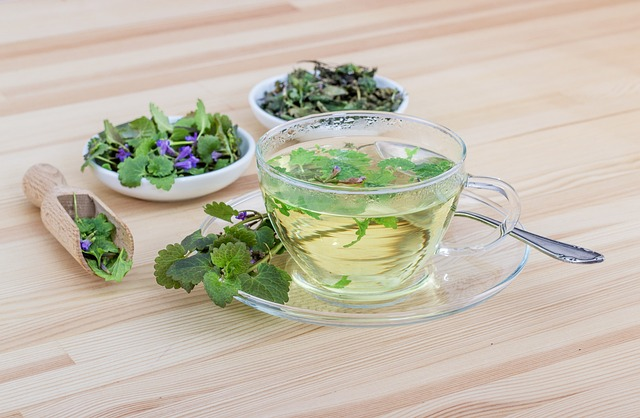
Popular herbal teas like chamomile, ginger, and hibiscus offer a wide range of health benefits. For example:
-
Chamomile tea is known for its antioxidant properties, anti-inflammatory effects, and relaxing and calming properties.
-
Ginger tea boasts antioxidant properties, anti-inflammatory effects, immune-boosting properties, and even antimicrobial properties.
-
Hibiscus tea provides antioxidant properties, anti-inflammatory effects, calming and relaxing properties, and digestive benefits.
Consuming tea fresh herbal tea, including green tea, allows us to reap their full health benefits and enjoy the delightful flavors and aromas they offer. Whether you’re looking to unwind with a cup of chamomile or need a digestive aid in the form of ginger tea, the world of herbal teas, especially loose-leaf tea, has something to offer everyone.
So, the next time you brew a cup of your favorite herbal tea, not only will you be savoring its delightful flavors and aromas, but you’ll also be nourishing your body with a host of health benefits. Some of the health benefits of herbal tea include:
-
Boosting the immune system
-
Improving digestion
-
Relieving stress and anxiety
-
Promoting better sleep
-
Reducing inflammation
-
Supporting weight loss
-
Providing antioxidants
Cheers to a healthier, happier you!
Summary
In conclusion, the key to enjoying a delightful cup of herbal tea lies in understanding its shelf life, factors that affect its freshness, and proper storage techniques. By recognizing spoiled herbal tea and being aware of the risks associated with consuming expired tea, we can ensure that every cup we brew is safe and enjoyable. Additionally, repurposing old tea leaves and enjoying the health benefits of popular herbal teas makes our tea-drinking experience even more rewarding and eco-friendly. So go forth and enjoy every sip of your favorite herbal teas, and remember to store them properly for the best experience!
Frequently Asked Questions
How do you know if herbal tea is bad?
Can herbal tea go bad? If your tea has been stored properly, you may not be able to tell if it’s bad just by looking at it or smelling it - old tea may just have a stale flavor.
The best way to check is to brew a cup and see if it tastes weaker than usual.
Is expired herbal tea bad for you?
Pure herbal or Camellia sinensis tea does not expire, so it should be safe to drink after its expiry date.
However, the flavor and aroma may gradually diminish and it may taste bad and bitter if the tea contains any “likely to expire” ingredients.
Can you drink expired chamomile tea?
Chamomile tea should not have an expiration date, but instead a “best by” date. While it may be safe to drink expired chamomile tea, it will likely have significantly less flavor and a stale taste.
Therefore it’s not recommended to drink it.
Does herbal tea get moldy?
Yes, herbal tea can get moldy if it’s not stored correctly in an airtight container in a low-humidity environment.
This is why it’s important to store herbal tea properly to ensure it stays fresh and flavorful.
How should I store my herbal tea to keep it fresh?
Store your herbal tea in an airtight container in a cool, dry, and dark place to keep it fresh.
Avoid direct sunlight and strong smells.
Try the Elixir Mixer—our electric whisk bottle—crafting a diverse range of hot and cold drinks is streamlined. Fill it up, press the button, and 15 seconds later—get sipping. It will quickly become the MVP of your everyday rituals.
